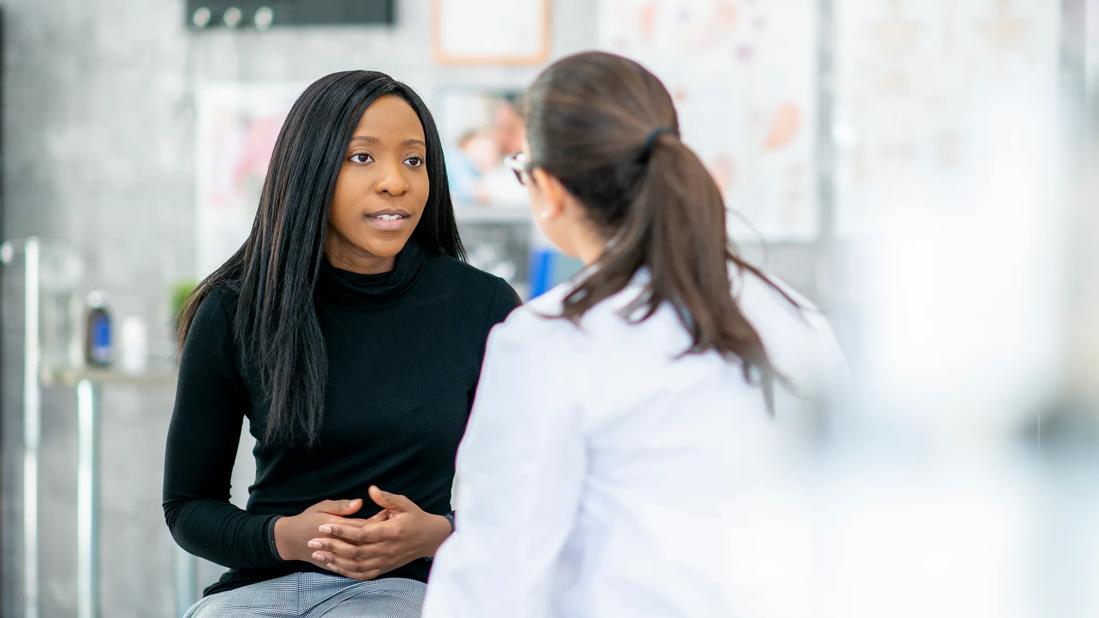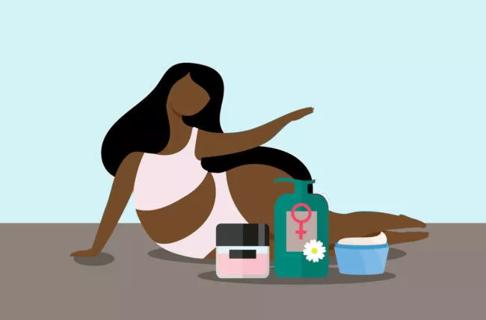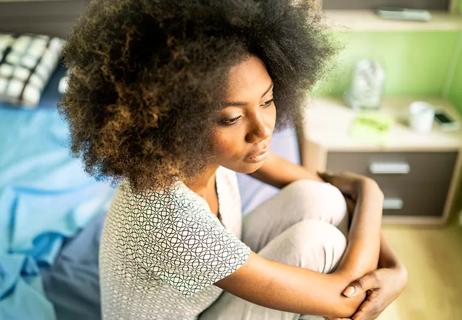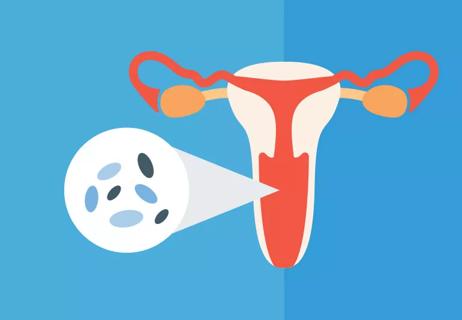Infections, cysts and conditions like endometriosis can result in a host of symptoms like burning and itching

Menstrual pain is no picnic, but pain and discomfort down there that’s not related to your monthly cycle can be even more upsetting. It might leave you wondering what the heck is causing your vaginal pain and what you should do about it.
Advertisement
Cleveland Clinic is a non-profit academic medical center. Advertising on our site helps support our mission. We do not endorse non-Cleveland Clinic products or services. Policy
Whether your vagina hurts a little or a lot, you shouldn’t just ignore it. The pain could be coming from your actual vagina (the internal organ) or from the labia and skin that form your vulva (your outside genitalia).
“Many people think it’s all the same thing,” says women’s health specialist, Jessica Strasburg, MD. “To a lot of people, your vagina includes the vagina and the vulva. But the causes of these types of pain are very different. And while your mind may go straight to cancer, that’s rarely a cause.”
So, where does that leave you? Dr. Strasburg explains what may be causing your vaginal pain.
You may be asking yourself: Why am I throbbing down there? Why does my vagina hurt?
And there’s not one universal pain or feeling that comes with vaginal pain. In fact, vaginal pain comes in many forms. You may feel:
“You may feel a mixture of types of pain, often confusing the picture,” states Dr. Strasburg. “Pain can occur from the organs in the pelvis (bladder, uterus, colon) to muscular pain (such as pelvic floor tightness) and also nerve pain (for example pudendal neuralgia).”
Advertisement
Many things may be causing your vagina pain. Dr. Strasburg outlines some of the most common ones.
Both yeast and genital herpes infections are vulvar conditions that can cause the kind of pain in your vagina we’re talking about.
Yeast infections cause swelling, itching and pain, especially during sex or urination. They can also be triggered by antibiotics.
Herpes is considered a sexually transmitted infection (STI). A herpes infection causes raw, painful sores that typically last from three to 14 days. Contact with urine exacerbates the discomfort.
Other STIs, including gonorrhea, chlamydia and trichomoniasis, can also cause sharp pain in your vagina, as well as itching and burning.
In many cases, you can treat a yeast infection with over-the-counter medication. But see a doctor if the problem persists.
STIs require prescription drugs. If you’re diagnosed with an STI, your partner will also need testing and treatment to prevent reinfection.
Bacterial vaginosis (BV) happens when there’s an overabundance of bacteria in your vagina. You may feel irritation or itching or have vaginal discharge that has a “fishy” odor. It can even burn when you pee. This vaginal infection can’t be treated with over-the-counter medication, so you should see your healthcare provider, who can prescribe antibiotics.
Vulvodynia can make you miserable. Your doctor may diagnose vulvodynia if you have vulvar pain that lasts for at least three months.
The underlying cause is unknown, but the condition prompts painful intercourse and sensations of rawness, throbbing, burning, stinging and itching. In other words, it’s not pleasant.
“Vulvodynia can really impact your life because you avoid intercourse, and it’s uncomfortable to wear certain types of clothing,” Dr. Strasburg says. “You feel like something is always wrong. It can cause great emotional distress.”
You can ease symptoms by wearing loose clothing and cotton underwear without seams and changing your clothes after exercising.
A similar cause may be vaginismus, which is when the muscles around your vagina involuntarily contract or tense. This can happen if you try to insert a tampon or during intercourse or even a pelvic exam. The spasms can cause mild pain and discomfort.
Your doctor may suggest using topical lidocaine to ease pain during intercourse. Topical and oral medications prescribed by your physician can also treat vulvodynia and vaginismus, as can cognitive behavioral therapy.
These common cysts develop when the Bartholin glands responsible for vaginal lubrication become blocked. Many Bartholin’s cysts don’t cause pain and don’t always require treatment.
Advertisement
But these tender lumps at the vaginal opening may become pus-filled and painful with infection. You may notice the pain whether you’re sitting, walking or having sex.
Try sitting in a warm bath to ease your discomfort.
“Talk to your doctor if pain or swelling persists. Surgical drainage or antibiotics may be necessary,” Dr. Strasburg says.
Endometriosis occurs when tissue similar to that of your uterine lining grows in other areas of your pelvis, abdomen and chest. It’s a common cause of pelvic pain and can also lead to vaginal and vulvar pain.
Not only does this condition cause more painful periods and pain during sex, but it can also cause infertility. Other symptoms include:
These symptoms tend to worsen during periods.
Studies show there’s a small but increased risk of ovarian cancer in people with endometriosis. Be aware of the most common symptoms of ovarian cancer, which include:
Notify your physician if you have these symptoms.
Over-the-counter pain medications may help ease endometriosis symptoms. If problems persist, your doctor may suggest hormone therapy or surgical options, including a hysterectomy.
Advertisement
Adenomyosis happens when tissue that’s similar to your uterine lining grows into the muscle wall of your uterus. This can make the size of your uterus double or triple in size. You may experience painful, heavy periods and feel bloated.
The disorder can cause pain during sex and even lead to infertility. While there’s no known cause of adenomyosis, it may be due to hormones, genetics or inflammation.
“For the majority of people, pain and symptoms from endometriosis and adenomyosis tend to improve and resolve after menopause, as estrogen production in our bodies decreases,” explains Dr. Strasburg. “However, some studies show that there are people who still have symptoms after menopause, unfortunately.”
Your doctor may recommend over-the-counter pain medication to ease cramping and pain. Certain hormonal medications can help regulate abnormal bleeding. Surgical options include an adenomyomectomy (the removal of adenomyosis from your uterine muscles) or a hysterectomy.
Another type of growth that can happen in or around your uterus is uterine fibroids.
These noncancerous tumors can cause heavy periods, back pain (which can feel like stabbing pain), frequent urination and pain during sex. But sometimes you may not experience any symptoms.
Advertisement
The treatment for uterine fibroids depends on the size, location and number of fibroids. Medications can include over-the-counter pain medication, hormonal medications and gonadotropin-releasing hormone (GnRH) agonists, which work by shrinking fibroids.
There is also a variety of surgical options, if necessary, but your doctor will determine what the best option is for you.
Pelvic discomfort can also lead to painful intercourse urinary and bowel dysfunction.
Many things can cause pelvic floor pain, so work with your doctor to pinpoint the culprit. A common cause is pelvic floor dysfunction or levator spasm, where pelvic floor muscles spasm as a reflex to other types of pain.
Pelvic congestion syndrome (similar to varicose veins, but in the pelvis) and irritation of the pudendal nerve (one of the main nerves in the pelvis) can also cause pelvic pain.
Something that seems as small as a cut from shaving or irritation from waxing in that area can cause vaginal discomfort.
Childbirth can also result in injury and trauma in the form of vaginal tearing. The tissue around your vagina and perineum can possibly tear, causing pain and discomfort. You may need stitches to help the tear heal.
Sexual assault or abuse can also cause physical trauma. If you experience sexual assault or abuse, contact emergency services or visit a healthcare provider right away.
You may experience vaginal dryness from time to time — especially during menopause when your estrogen levels decrease.
You may feel pain, discomfort, burning, itching and soreness as you sit, exercise, pee or during sex. And that’s due to a lack of lubrication along your vaginal lining.
To help replace the lost estrogen, a provider may recommend a low-dose estrogen cream, ring or tablet. Over-the-counter options such as vaginal moisturizers and lubricants can also help.
You may feel embarrassed when it comes to talking to a healthcare provider about your vaginal pain, but don’t hesitate to talk to your doctor — that’s what they’re there for.
While your doctor can typically diagnose a yeast infection based on your symptoms, they may perform certain tests if they suspect bacterial infections or STIs. They may also need to perform a physical exam and a pelvic exam.
Ultimately, identifying whether there’s a pattern to your pain can help your doctor treat you.
“Pay attention to your symptoms and get them evaluated as soon as possible,” Dr. Strasburg advises. “The most important thing is visiting the doctor. And if you’re not seeing improvement, you might need to see a specialist.”

Sign up for our Health Essentials emails for expert guidance on nutrition, fitness, sleep, skin care and more.
Learn more about our editorial process.
Advertisement

Strong vaginal and groin odor is normal for many people — it can be the result of sweat, urine, infections and more

Yes, it could be a yeast infection, but there are also several other causes for an itch down there

Moisturizers, lubes and prescriptions can all be helpful

How to tell when odor is a warning sign

How to identify and treat vaginal conditions

It’s important to angle it toward your rectum or back, along the natural curve of your vaginal canal

To help manage symptoms, switch to more absorbent period products, make healthy lifestyle changes and explore treatment options

Yes, you can pee with a tampon in; no, they won’t stretch out your vagina or make cramps worse!

Even small moments of time outdoors can help reduce stress, boost mood and restore a sense of calm

A correct prescription helps your eyes see clearly — but as natural changes occur, you may need stronger or different eyeglasses

Both are medical emergencies, but they are very distinct events with different causes